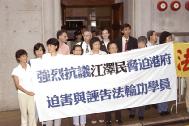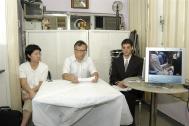Hong Kong: Defense Attorney Points Out in His Final Submission that the False Accusations Are "Political Persecution" (Photos)
Since the court opened on June 17, the trial of Falun Gong practitioners facing obstruction charges has been prolonged and postponed again and again. Finally, Tuesday August 6, lawyers of both prosecutors and defendants presented their final arguments. The defense lawyer pointed out in his final submission that the unusual way that the Hong Kong government dealt with this case and the major prosecutor's fallacious arguments during witness testimony show that this is not an ordinary obstruction case. During the trial, the judge also expressed to the court that he is facing a very important decision, which will affect the Hong Kong people's future freedoms of appeal and assembly.
On the morning of August 7, Wednesday, 2002, the defense lawyer, John Haynes, noted that the prosecutor's 33-page-long final submission was the longest submission that he has ever seen for an obstruction case. In addition, the Hong Kong government appointed a senior assistant criminal case prosecutor, Kevin Zervos, to handle this obstruction case. Both facts demonstrated that the Hong Kong SAR government attaches great importance to this obstruction case, because they understand that this incident will involve complicated legal consequences. That they pay so much attention to this case gives people the impression that under pressure, they are determined to convict the 16 defendants.
Aiming at the true nature of this case, defense lawyer John Haynes proposed that the Judge could request the prosecutor use real data to prove how an appeal occupying 7 square meters could possibly create obstruction of traffic in an area of 140 square meters. This way a justifiable verdict could be rendered under completely objective conditions.
Haynes also pointed out in his submission that the prosecutor impetuously assaulted the defendants' credit ratings. However, he is not able to see how their credit ratings have anything to do with the obstruction case. If this were truly an obstruction case, he questioned why a small-scale protest is not acceptable on a sidewalk spacious enough to hold a football game. Haynes considered that this accusation is actually a political persecution. But the defendants that he knows do not have any political intentions, nor are they against the government. He said the defendants' protest was based on humanitarian grounds, because they believe that their fellow practitioners (under persecution) in Mainland are being killed.
Haynes mentioned that when defendant Lu Jie testified, she was asked about her education level. However, because of the higher education she received, she was not treated fairly in court. The judge insinuated that she intentionally avoided questions when she briefly hesitated before answering prosecutors' questions.
When the prosecutor asked questions of the defendants, he kept asking things such as who was in charge, who printed the flyers, and who made suggestions or offered advice. This gave people the impression that this was paving the road for future persecution. Aiming at the way the prosecutor handled this case, Haynes said, according to the situation of Hong Kong Falun Gong practitioners, for certain issues such as Lu's background, whether she took the initiative to attend the March 14 protest, or what kind of organization Falun Gong is, a court that cares about humanity and is aware of the situation should be able to understand Lu's hesitation. On the other hand, Haynes did not see how these questions had anything to do with the obstruction case.
Haynes also said that when the prosecutor raised questions, he often focused on unrelated issues. For example, when Lu was asked at what time she went to the Chinese Liaison Office from her nearby workplace on March 14, the prosecutor requested Lu to provide the accurate time many times. But Haynes does not consider it important in this case whether Lu knew the exact time. He thinks that it is sufficient to know that she left her workplace almost at the same time as the Swiss practitioners went to the Chinese Liaison Office.
For the issue that the prosecutor insisted that the defendants use absolute "yes" or "no" to answer his questions, Haynes said that this would create confusion, because on many occasions, when witnesses answered the questions, they could not simply use "yes" or "no" to truthfully answer them.
For the protest site, Haynes pointed out that there was even less chance to create obstruction on the sidewalk in front of No. 160 (the Chinese Liaison Office" than that of the No. 162, because the sidewalk of No. 160 does not have trees in the middle as that of No. 162. Although the prosecutor insisted many times in court that the police approved protest site at No.162, Haynes pointed out that one could see from the video footage provided by the defendants, their appeal activities were often interfered with by the police even at No. 162. Moreover, the police did not publish this site on the government constitution report, nor did they specify this site as the appointed protest site.
Haynes said that it is true that the police received pressure from the Chinese Liaison Office. He said if this could not be called "pressure," at least it is a kind of "influence." He gave an example. A police officer involved in this case had received 5 complaints from the Chinese Liaison Office within one hour after the appeal started.
Another defense lawyer, Paul Harris, will present his final submission on August 8, Thursday.
Four Falun Gong practitioners from Switzerland and twelve Hong Kong practitioners were violently arrested by the Hong Kong police during a peaceful appeal in front of the Chinese Liaison Office on March 14. Later, they were accused with "potentially causing public obstruction," "willfully obstructing police," and "attacking police." This trial based on false accusations should have never existed from the first place, yet it has lasted 25 days in court since it began on June 17.

